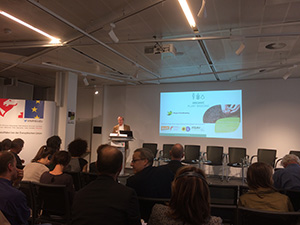
Market concentration in the seed sector is growing incessantly. Demanding better seed policies is not enough to stop this trend. Strategies and practical alternatives to counter further privatising and monopolisation of seed are needed to save the basis of our food system. These were themes presented and discussed at the ‘Seed as Commons’ conference in Brussels on Thursday 19th October 2017, organised by the Demeter-International Brussels office and hosted by Maria Heubuch MEP.
Johannes Wirz, Researcher, Section for Agriculture – Goetheanum, Switzerland, presented the newly released study Seed as a Commons explaining that non-profit organic breeders have the expert knowledge to develop locally adapted varieties for organic agriculture. “Organic breeders deserve that governmental authorities as facilitators and the value chain as partners support their work.”
Johannes Kotschi from OpenSourceSeeds / Agrecol, Marburg, Germany presented in his key-note the new strategy of open-source seeds licensing: “Commons can only be sustained if they are protected. With the OSS Licence, a way has been found to redress this. The licence may, therefore, become an important tool to re-build a commons based seed domain to be established as a second column to counterbalance the corporate seed sector.”
Monika Messmer, President of the European Consortium for Organic Plant Breeding (ECO – PB) and FiBL researcher highlighted the need for investment in organic breeding and innovation: “Projects like LIVESEED that has just started under the Horizon 2020 framework are of major importance to move the organic sector forward. We need to improve organic seed and plant breeding, therefore we need action on the technical, scientific, socio-economic and legislative level.”
Effimia Chatzinikolaou, Policy Coordinator IFOAM EU Group lines out: “It is a priority for the organic movement to develop the organic plant breeding sector. It is important to change the current legislative framework on seed marketing in order to facilitate market access for organically bred varieties. If we want to reach 50% organic farming in the EU by 2030, this target also needs to be reflected in public research funding.”
Peter Kunz, organic breeder from Switzerland, added: “Bringing forward organic breeding is a common task of the whole organic food chain. Organic operators should get actively involved and dedicate part of their profits to breeding.”
Maria Heubuch, Green MEP was convinced that independent organic plant breeding is of key importance for the future of organic farming.
Alexander Gerber, Vice President of Demeter-International, concluded that plant breeding serves the society: “Therefore, different models to ensure that the genetic basis of our daily food remains an accessible good need to be further developed and organic breeding needs recognition as an innovative approach for future food security.”
Reports from the conference will be available at http://organic-plant-breeding.org/
